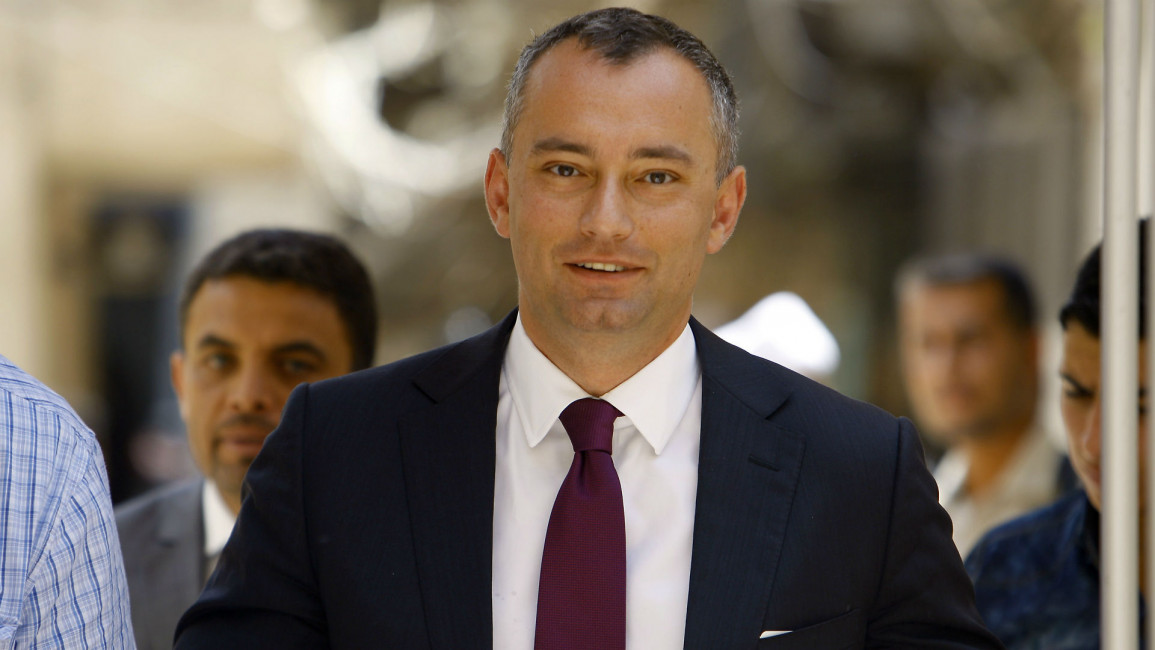
Enter the 'great friend of Israel'
It took less than two years for Bulgarian diplomat Nickolay Mladenov to ask the UN secretary general Ban Ki-moon to relieve him as his representative in Iraq and assign him a less complicated mission.
Ban responded by appointing him the special coordinator for the Middle East peace process to succeed the Dutch diplomat, Robert H Serry.
Mladenov will be the personal representative of Ban at the Palestine Liberation Organisation (PLO), the Palestinian National Authority (PNA) and the international quartet on the Middle East, composed of the UN, EU, US and Russia.
Top of his new agenda will be the revival of the peace process. There is also the reconstruction of Gaza to consider, and the aftermath of Israel's summer war.
Such things have toppled several more experienced international envoys.
Mladenov's statements on the Middle East are noteworthy. In May 2013 in Jerusalem, he told a world forum on anti-Semitism of Israel's "right to exist". In February 2010 he told the Jerusalem Post that Israel had a "right to defend itself in a difficult security environment".
On Palestine, Mladenov, has called on the international community to "pay attention to the difficulties faced by the Palestinians".
This may explain why some of Palestinian leaders fear the man whom the Israelis describe as "the great friend of Israel". Taysir Khalid, a member of the politburo of the Democratic Front for the Liberation of Palestine, considered him "unqualified to play this role and does not evoke trust".
| In May 2013, Mladenov spoke of Israel's 'right to exist'. In February 2010, he said it had a 'right to defend itself in a difficult security environment'. |
Kayed al-Ghoul, the politburo member of the Popular Front for the Liberation of Palestine, described Mladenov as "known for his strong common grounds with the Israeli state of occupation and for his justification and support of its crimes against the Palestinian people".
Mladenov might also be surprised that his friends in Israel care nothing for the UN, its secretary general, resolutions and envoys because they believe themselves to be "above international law". Neither are they concerned with "the peace process" which they have long claimed as dead, allegedly the result of "unilateral" actions by Palestinians.
Consequently, Mladenov either submits to Israeli wishes or he will meet the fate of his predecessor Serry, who angered Israel because he only "tried to convince the Palestinian Authority to transfer $20m frozen in Qatar to solve the crisis of the salaries of the employees in Gaza", in the words of the Israeli foreign minister, Avigdor Lieberman.
On the Palestinian side, Mladenov will see a reality different from what his friends in Israel have portrayed. First he will see the Israeli settlements which have overwhelmed the occupied West Bank. He will see the destruction wrought on the Gaza Strip.
In between he would watch all what Israeli policies have done to the Palestinian land, earth and people. These are the policies that have led to the "death" of the peace process, from the Palestinian perspective.
| Will joining the ICC lead to justice? Read Jeff Handmaker and Friederycke Haijer. |
No doubt the chronic division of power in the Palestinian territories will provide an obstacle to reaching an inter-Palestinian consensus on negotiations and the future of the final settlement with Israel.
It would also prevent progress on reconstruction in Gaza. Donor countries refuse to deliver construction funds to Hamas, which runs Gaza. Israel refuses to lift its blockade to allow construction materials into Gaza. Hamas refuses to hand the administration of the strip over to the PNA without first reaching an agreement on its issues with the PNA.
In the face of all this, it is unlikely that the mission of the new UN envoy to the Middle East will be easy as he thinks. Perhaps Mladenov has to reconsider before he assumes his duties to make sure that he can resurrect the peace process, which Palestinian and Israeli leaders have already said is dead, regardless of the disagreement between them on the causes of its death.
Who is Nickolay Mladenov?
Born on 5 May 1972, he was the foreign minister of Bulgaria between 2010 – 2013 and was a member of parliament from 2001 to 2005. He has also worked at the World Bank and the European Institute. He was appointed in August 2013 as UN special representative and the head of the UN assistance mission for Iraq. Mladenov was awarded an MA in war studies from King's College London, and an MA and BA in international relations from the University of National and World Economy in Sofia.
This is an edited translation of the original Arabic.




